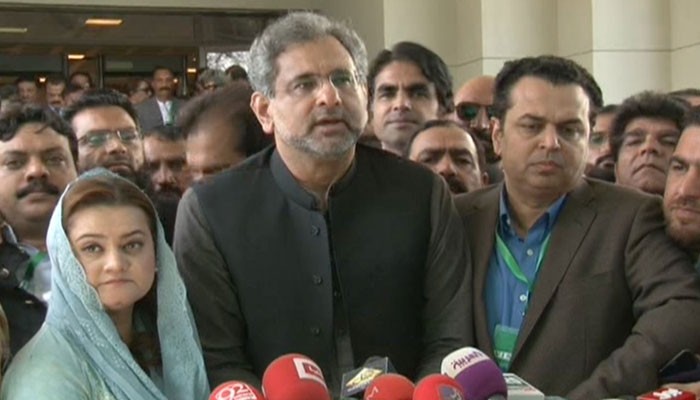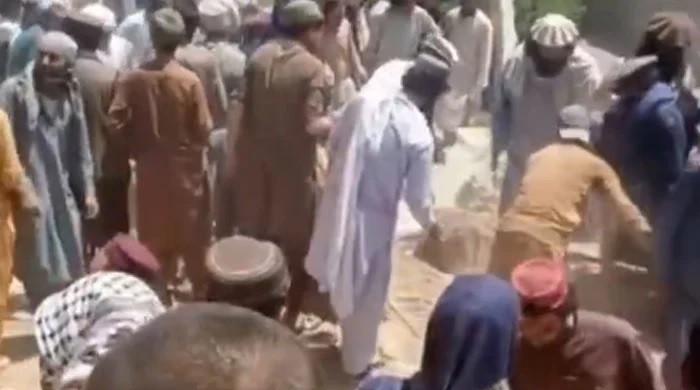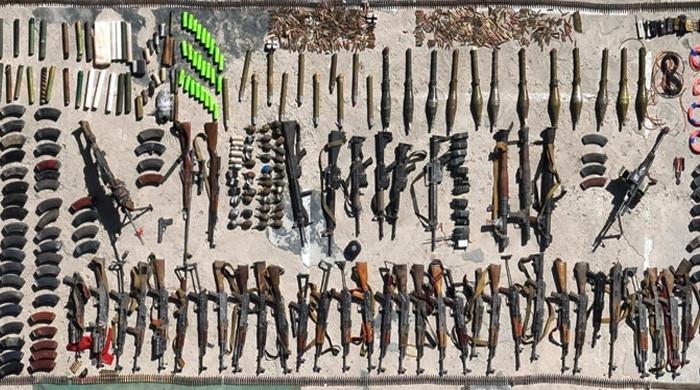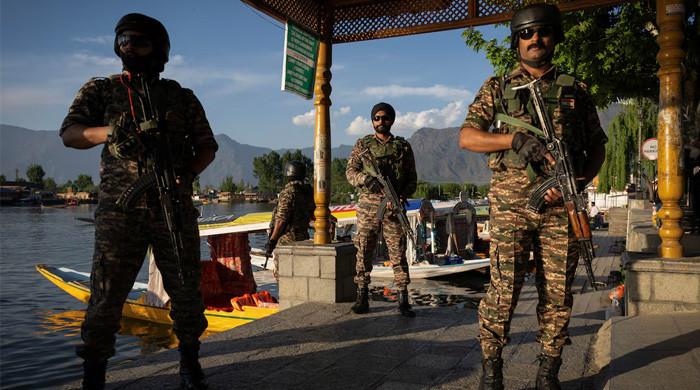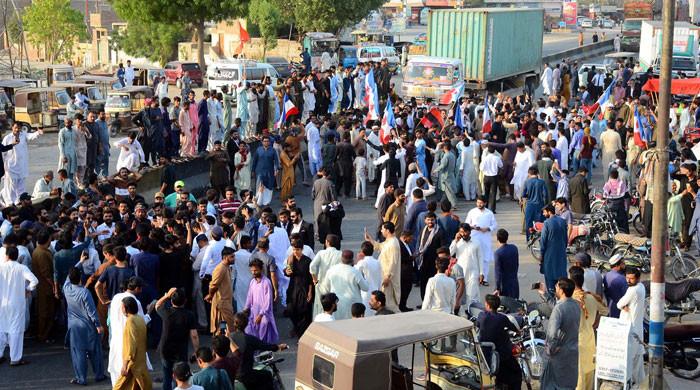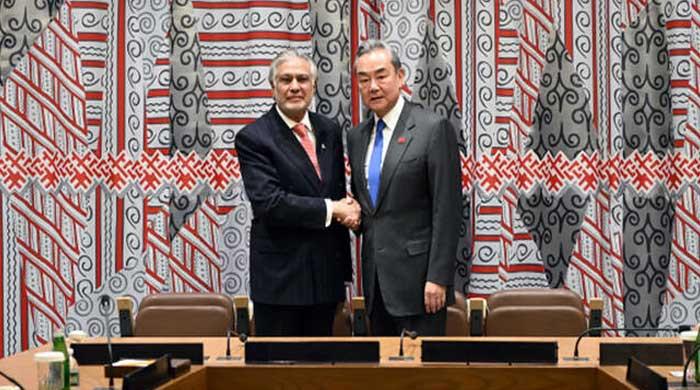SC grants Nawaz bail on medical grounds for six weeks
A three-judge bench headed by CJ Asif Saeed Khosa heard the former premier's petition, Nawaz not allowed to leave the country
March 26, 2019
ISLAMABAD: The Supreme Court on Tuesday granted former prime minister Nawaz Sharif bail for six weeks to obtain medical treatment within the country.
A three-judge bench headed by Chief Justice of Pakistan Justice Asif Saeed Khosa heard the former premier's petition against a verdict by the Islamabad High Court (IHC) to not grant him bail on medical grounds in the Al-Azizia corruption reference.
Announcing a short verdict, Justice Khosa directed the former premier be granted bail for six weeks to get medical treatment within Pakistan. Nawaz will not be allowed to leave the country, the chief justice said.
The former premier has been directed to submit two bail bonds amounting to Rs10 million.
Earlier, after both sides concluded their arguments, the court reserved its decision on the petition.
Nawaz be granted bail for eight weeks: counsel
During the hearing, Nawaz's counsel Khawaja Haris asked the court to grant the former premier bail for eight weeks. "There will be no loss if Nawaz is granted bail for eight weeks. Even when Kulsoom Nawaz was sick people kept saying otherwise and when she passed away people said she had died earlier."
Justice Khosa, however, inquired as to what will happen if the IHC verdict on the appeal is announced during this time as it has been fixed for hearing on April 9. To this, Haris said, "Only notices have been issued so far which I have not even received. If the appeal if even fixed for hearing on April 9, it will take time as the record is based on more than 4,000 pages."
"As far as the treatment is concerned, my client's life is at risk. He will surrender himself to the court after the treatment is complete," he added. Nawaz's counsel further said that his client is not leaving the country and his passport is with the court.
Order
i) The sentence of the petitioner handed down by the Accountability Court-II, Islamabad in Reference No. 19 of 2017 in respect of an offence under section 9(a)(v) read with section 14(c) of the National Accountability Ordinance, 1999 is suspended and he is admitted to bail for a period of six weeks from the date of his release as a consequence of this order. It is made clear that during this period the petitioner shall not leave or be allowed to leave the country.
ii) Bail granted to the petitioner through the present order shall automatically stand canceled upon expiry of six weeks from the date of his release whereupon the petitioner shall surrender to custody voluntarily failing which he shall be retaken into custody. Surrender to custody by the petitioner shall not include surrendering before a court with an application for bail.
iii) During the above mentioned period of six weeks the petitioner may get himself medically treated from medical practitioners and medical facilities of his choice in Pakistan.
iv) If during that period of six weeks the appeal filed by the petitioner before the Islamabad High Court, Islamabad is finally decided by the said Court then upon such decision custody of the petitioner shall thereafter be regulated by an order of the High Court to be passed in that regard, if need be.
Nawaz's counsel submits letter
As the hearing began, Nawaz's counsel Khawaja Haris briefed the court regarding the former premier's medical reports and submitted a letter from one Dr Lawrence to Dr Adnan.
The chief justice pointed out that the letter is written by a private individual to another private individual and was not addressed to court. CJP inquired about the letter's "legal status" and how it can be presented as evidence.
Nawaz's lawyer stated that he was "not depending upon the letter" and it was a review by doctors on the former premier's condition.
Justice Khosa then asked the counsel to tell the court how Nawaz's condition is different from that mentioned in his medical history. "You have to prove that Nawaz's health is deteriorating and that staying in jail is life threatening for him," he said.
Haris said that Nawaz has had seven medical stents placed and that all medical boards have recommended angiography. "The former premier is suffering from heart ailments and requires an angiography which is not simple but rather complicated. He is also suffering from a kidney disease which is in its third stage and his blood pressure and blood sugar level need to be monitored regularly."
'Can issue orders for treatment in any hospital across Pakistan'
Justice Khosa asked, "Is there no hospital in Pakistan with such doctors, facilities and staff that Nawaz can be treated there? You want Nawaz to be granted bail for his medical treatment. We can issue orders for his medical treatment in any hospital across Pakistan."
The former premier's counsel, however, said, "In jail, Nawaz will be under mental pressure and stress and his medical treatment will not be appropriate in such a condition."
CJP Khosa then asked whether this stress will go away in two weeks. "What will happen when the verdict on the appeal is announced in two weeks?" the chief justice questioned and added "Arrangements can be made for his medical treatment." However, Nawaz's counsel said, "This is a complicated matter and cannot be decided in two weeks. To hurriedly announce a verdict on the case will not be justice."
The chief justice inquired, "How can bail be granted when the appeal is fixed for hearing? Bail is granted when the appeal is adjourned."
"Will Nawaz be satisfied with treatment in Pakistan if he is sent home and there is no mental pressure or stress?" he further asked. "If we believe that Nawaz's condition is worsening, then can we help with medical treatment? During the last hearing you had said that Nawaz trusts his doctor," he added.
Haris then pointed out that in Dr Asim Hussain's case, bail was granted on medical grounds. Haris further told the bench that five medical boards had been formed to examine Nawaz's medical condition and all of them had declared that the former premier's kidney ailment was at the third stage. "The medical boards had also recommended that he should be admitted to a hospital," the former premier's counsel said.
No threat to Nawaz's life: NAB prosecutor
After both sides concluded their arguments, CJP Khosa and Justice Yahya Afridi questioned the NAB prosecutor. The NAB additional prosecutor said that Nawaz "is being monitored 24 hours".
"Nawaz has no life-threatening disease," the additional prosecutor said. Justice Afridi, however, asked, "If there is no threat to his life then why is the medical board not conducting his angiography."
Justice Sajjad Ali Shah added, "You kept shifting him from one hospital to another. No report said that Nawaz refused to get treated."
The chief justice then held consultations with the judges and wrote down the judgment.
The Islamabad High Court on February 25 had dismissed Nawaz’s petition seeking bail and suspension of his seven-year sentence in the Al-Azizia reference on medical grounds.
The former premier has been imprisoned at Kot Lakhpat jail since December 2018 following his conviction in a corruption reference in line with the Supreme Court’s July 2017 verdict. On December 24, an accountability court in Islamabad had sentenced Nawaz to seven years in prison along with a fine of Rs1.5 billion and US$25 million in the corruption reference.
Court has granted Nawaz relief for treatment: Khaqan Abbasi
Speaking to the media after the court announced the verdict, former premier Shahid Khaqan Abbasi said, "The court has granted relief to Nawaz Sharif for treatment. I want to thank friends and workers of Muslim League who prayed for Nawaz’s health.”
“Despite attempts of the Punjab and federal government the court has granted Nawaz relief for treatment,” he added.
“It is on record today that Nawaz’s health is in danger. It was also brought on record that Nawaz never refused medical treatment,” Abbasi said.

